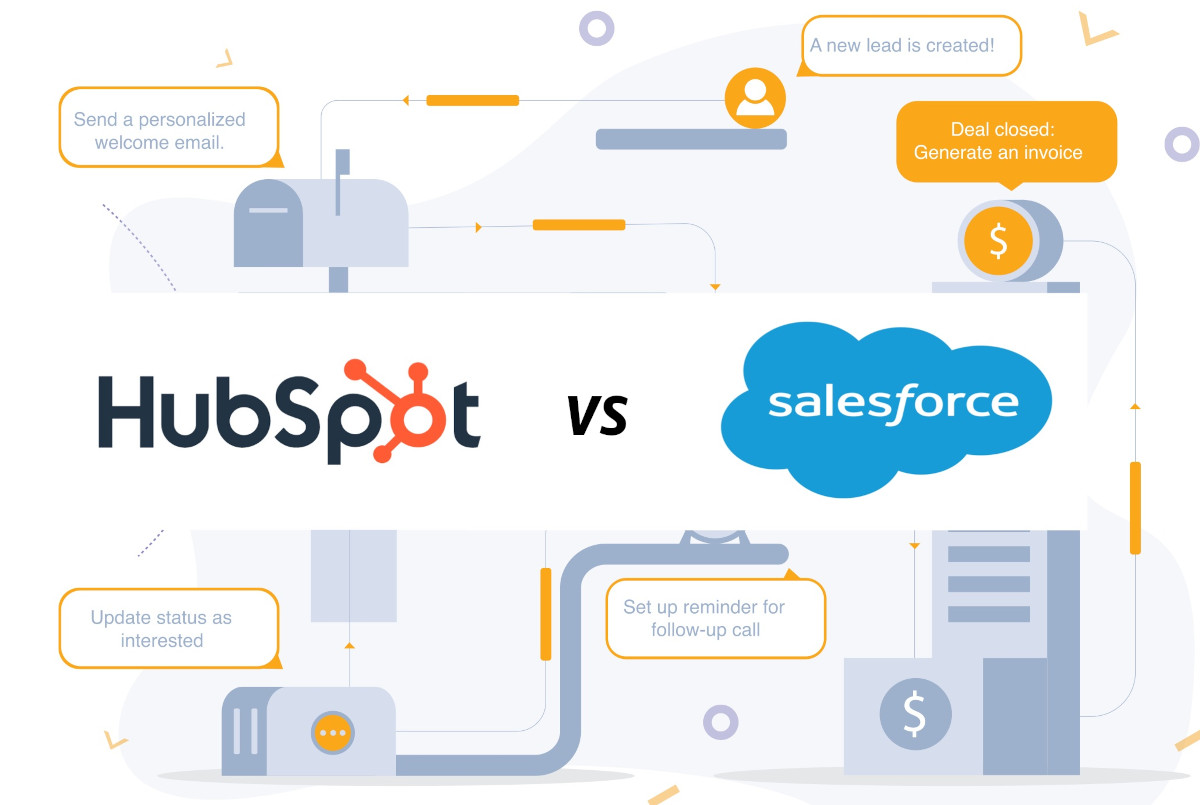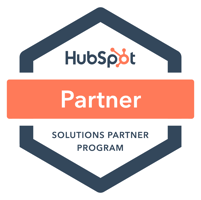Unpacking HubSpot's Smart CRM and AI Capabilities In the current digital era, establishing robust...
Salesforce vs HubSpot - comparison
Choosing the right CRM (Customer Relationship Management) platform is essential for businesses looking to effectively manage customer interactions, optimise sales processes, and drive marketing efforts. Two leading CRM solutions, Salesforce and HubSpot, provide a wealth of features designed to cater to businesses of all sizes. In this blog post, we will conduct a comprehensive comparison of the two platforms, examining sales features, marketing automation, integrations, user experience, pricing, security, and compliance.

Core CRM Features
Both Salesforce and HubSpot offer comprehensive CRM features that enable businesses to manage customer interactions and streamline sales processes. These features include contact and company management, deal tracking, task management, email scheduling, and reporting.
While Salesforce is known for its extensive customisation options and advanced features, HubSpot stands out with its free CRM plan, providing an accessible starting point for small businesses and startups. Additionally, HubSpot offers a range of tools designed to simplify sales, marketing, and customer service tasks, such as live chat, email templates, and meeting scheduling.
Sales and Customer Service Tools
Salesforce and HubSpot both provide a suite of sales and customer service tools that can help businesses improve their customer interactions, drive sales, and enhance customer satisfaction. Key features include pipeline management, lead scoring, opportunity tracking, and ticketing systems.
Salesforce offers advanced features like AI-powered Einstein Analytics, which provides sales forecasting, lead scoring, and actionable insights based on customer data. The platform also includes tools for territory management, complex sales processes, and customisable sales dashboards to monitor team performance.
HubSpot, on the other hand, focuses on providing an intuitive interface and user-friendly tools that streamline sales and customer service tasks. Features such as deal tracking, sales task automation, and live chat enable businesses to engage with customers and prospects more effectively. HubSpot's ChatSpot integration further simplifies sales and customer service tasks by allowing users to perform various CRM activities through chat-based commands.
One notable feature that sets HubSpot apart is HubSpot Insights, which automatically enriches contact and company records with valuable information sourced from over 20 million businesses. This feature allows sales and customer service teams to access a wealth of information without manual research, helping them better understand their customers and prospects. Insights include company size, industry, revenue, and more, enabling teams to prioritise leads and personalize their interactions.
Moreover, HubSpot offers a range of customer service tools, such as ticketing systems, customer feedback surveys, and knowledge base creation, that help businesses provide better support to their customers. HubSpot's Service Hub enables teams to track, prioritise, and resolve customer issues more efficiently, leading to improved customer satisfaction and loyalty.
In summary, while Salesforce provides a comprehensive suite of advanced sales and customer service features, HubSpot's intuitive interface, user-friendly tools, ChatSpot integration, and valuable Insights functionality make it an appealing choice for businesses looking to streamline their sales and customer service processes and improve customer engagement.
Marketing Automation
Both Salesforce Marketing Cloud and HubSpot Marketing Hub offer powerful marketing automation features that enable businesses to streamline their marketing efforts and drive customer engagement. Key capabilities include email marketing, social media marketing, lead nurturing, landing page creation, and analytics.
While Salesforce provides advanced tools, such as AI-driven predictive analytics and multivariate testing, HubSpot focuses on delivering a user-friendly interface and tools that are accessible to users with varying levels of technical expertise. HubSpot's innovative ChatSpot integration also enhances the platform's marketing automation capabilities by enabling users to perform tasks like drafting emails, pulling reports, and creating new segments through chat-based commands.
Integrations and Ecosystem
Salesforce and HubSpot both boast extensive integration options through their respective marketplaces, allowing businesses to extend their CRM platform's functionality with additional tools and services. Salesforce's AppExchange offers a larger number of available apps, providing businesses with a wide range of options for customisation and integration.
HubSpot's App Marketplace, on the other hand, offers a carefully curated selection of high-quality apps designed to enhance the platform's capabilities. The integration of ChatSpot with HubSpot further extends the platform's versatility, enabling users to perform various CRM, sales, and marketing tasks directly through chat-based commands.
User Experience and Ease of Use
While Salesforce's advanced features and customisation options provide greater flexibility, they can result in a steeper learning curve and increased complexity for new users. Salesforce's user interface is feature-rich but may not be as intuitive for new users compared to other CRM platforms.
In contrast, HubSpot's user-friendly interface, guided onboarding process, and focus on simplicity make it a more accessible option for businesses with varying levels of technical expertise. HubSpot's ChatSpot integration further enhances the user experience by allowing users to perform tasks through chat-based commands, simplifying various CRM, sales, and marketing activities. HubSpot also offers extensive support resources, including a comprehensive knowledge base, training programs, and responsive customer support, ensuring users have access to the assistance they need when using the platform.

Pricing and Scalability
Salesforce offers a tiered pricing structure, catering to businesses of various sizes and requirements. Its pricing plans include Essentials, Professional, Enterprise, and Unlimited, which provide progressively more advanced features as the cost increases. While Salesforce's tiered pricing allows businesses to scale their CRM solution as they grow, the cost can become substantial as the organisation expands and requires more advanced features.
HubSpot, on the other hand, offers a range of pricing options for its CRM, Sales, Marketing, and Service Hubs, making it accessible to businesses of all sizes. Key pricing plans include Free, Starter, Professional, and Enterprise, providing a scalable solution that accommodates the changing needs of a growing business. HubSpot's free CRM offers basic features, such as contact and company management, deal tracking, and email scheduling, making it an attractive option for small businesses and startups.
Salesforce:
Salesforce offers a variety of pricing plans to cater to different business sizes and requirements. The four main plans for its Sales Cloud are:- Essentials: £20 per user/month (billed annually) - Designed for small businesses, offering basic CRM features, lead and opportunity management, and email integration.
- Professional: £60 per user/month (billed annually) - Provides complete CRM features, customisable reports, and automation capabilities for businesses of any size.
- Enterprise: £120 per user/month (billed annually) - Offers advanced features, such as multiple custom profiles, territories, and workflow automation for larger businesses.
- Unlimited: £240 per user/month (billed annually) - Provides access to all Salesforce features, 24/7 support, and unlimited customisation options for enterprises.
HubSpot:
HubSpot's CRM is free, offering basic CRM functionality such as contact management, email tracking, and meeting scheduling.For additional features, HubSpot offers three main plans for each of its Marketing, Sales, and Service Hubs:
- Starter: Starting at £27 per month (billed annually) - Includes basic marketing, sales, and customer service tools suitable for smaller businesses.
- Professional: Starting at £396 per month (billed annually) - Provides advanced automation, reporting, and customisation options for growing businesses.
- Enterprise: Starting at £1050 per month (billed annually) - Offers advanced features, such as revenue attribution, custom event triggers, and predictive lead scoring for large organisations.
HubSpot often provides discounts for annual billing and occasionally runs promotional offers.
Guided onboarding is provided by HubSpot or HubSpot Partner while the full implementation and integrations can be done by HubSpot Agency.
Security and Compliance
Salesforce and HubSpot both prioritise the security of customer data and maintain compliance with industry standards and regulations. Key security features and certifications for both platforms include data encryption at rest and in transit, as well as compliance with GDPR, SOC 2 Type II and SOC 3.
While Salesforce provides extensive security features and certifications, HubSpot's commitment to data security is equally strong. In July 2021, HubSpot announced the opening of a new data center in Frankfurt, Germany, ensuring that European customer data is stored within the EU and adheres to strict data privacy regulations. This new data center further demonstrates HubSpot's commitment to protecting customer information and maintaining compliance with relevant regulations.
Conclusion
While both Salesforce and HubSpot offer comprehensive CRM solutions, HubSpot's commitment to flexibility, user-friendliness, and competitive pricing make it an attractive option for many organisations. HubSpot's scalable pricing model, intuitive interface, and innovative ChatSpot integration enable organisations to streamline their sales, marketing, and customer service processes more effectively, making it the preferred choice for many businesses in 2023.

